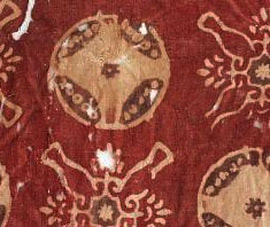
The Early Textiles Study Group (ETSG) came into being in 1981 after a small group of people working with or researching into archaeological textiles started to meet together on a semi-regular basis to discuss their work and problems, to share knowledge and experience, and to advance their knowledge by visiting collections and exhibitions together.
The number of those participating in the Group has grown gradually over the decades. As well as those involved with archaeological textiles the ETSG now embraces art-historians, conservators, material scientists, archivists, ethnographers and also those craft-workers who recreate early textiles and keep alive regional and ethnic textile technology. ‘Textile’ is here used as an umbrella term to cover all fibre products, including knitting, felt, lacework, braiding, basketry and cordage.
The group is run by a small, formal committee elected from the membership. Officers and contact details can be found on the Contact Us tab.
See Membership for information about how to become a member.
The themed biennial conferences are open to anyone and have become established events in the textile history calendar, attracting participants from all over Europe and overseas. Income from one conference is used to get the next conference under way. Additional funding provided by the British Council and the Pasold Research Fund has enabled guest speakers to be brought from many parts of the world. See Past Conferences.
Training courses on the identification of textile structures have also been introduced and are proving to be a valuable resource. Like the conferences, these are open to all. For more information, see Courses.
The number of those participating in the Group has grown gradually over the decades. As well as those involved with archaeological textiles the ETSG now embraces art-historians, conservators, material scientists, archivists, ethnographers and also those craft-workers who recreate early textiles and keep alive regional and ethnic textile technology. ‘Textile’ is here used as an umbrella term to cover all fibre products, including knitting, felt, lacework, braiding, basketry and cordage.
The group is run by a small, formal committee elected from the membership. Officers and contact details can be found on the Contact Us tab.
See Membership for information about how to become a member.
The themed biennial conferences are open to anyone and have become established events in the textile history calendar, attracting participants from all over Europe and overseas. Income from one conference is used to get the next conference under way. Additional funding provided by the British Council and the Pasold Research Fund has enabled guest speakers to be brought from many parts of the world. See Past Conferences.
Training courses on the identification of textile structures have also been introduced and are proving to be a valuable resource. Like the conferences, these are open to all. For more information, see Courses.
